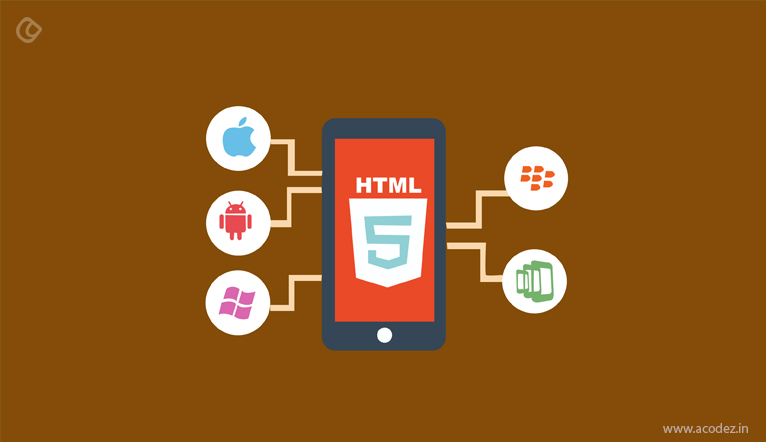With 7 billion mobile users in the world and 100 million active Mac users and 1 billion Windows-powered PC users, it is no wonder that more than 50 percent searches on Google are from mobile users. Hence, it is quite necessary to have a presence on the mobiles as well to reach a wide audience. This can be done with the help of mobile apps. There are three major mobile platforms available i.e. Android, iOS, and Windows. Out of this Android constitutes a major portion of the users available.
In due course of Mobile app development one of the major factor that needs to be taken into consideration is whether you should opt for native mobile application or hybrid mobile application. Before getting into this debate, it is necessary that you have a proper idea of the same and know the merits and demerits of both of these. This will help you to decide which option is the best for you.
What are Native Mobile Applications?

Native mobile applications also termed as native apps are application programs that has been developed keeping in mind to be used on a single platform or device. The native Android apps are written in Java and Kotlin whereas iPhone apps are written in Objective-C or Swift programming language. Being developed for a specific platform, these can make the most out of the operating system and utilize their features and other resources to their fullest.
What are Hybrid Mobile Applications?

Hybrid applications are the mobile applications that make use of the web applications and are available for different mobile platforms. These are developed in the native browsers, i.e. UIWebView for iOS and WebView for Android. Hybrid apps are developed using the web technologies like HTML, CSS and Javascript. These are then wrapped in a native application using platforms like Apache Cordova, Appcelerator Titanium, Xamarin, Unity, and many more such Mobile App Development Frameworks.
Some of the advantages of native mobile applications over hybrid mobile applications:
Native mobile application provides a number of benefits over hybrid mobile applications. Some of these are:
Speed
Native mobile applications make the most out of the resources and hence are relatively faster as compared to the hybrid mobile applications. This in turn offers better user experience to its users. The increase of internet speed and resources however compensates for the same.
Utilize resources optimally
Some of the features of the mobiles can be handled optimally with the help of the native applications. These make better use of the resource utilization that constitutes of both the hardware and software resources.
New functionalities and features immediately available
Mobile technology is changing day by day. It is due to these reasons that many new features are added on a regular basis. While the native mobile app development environments immediately receive these updates and changes, the hybrid app development may receive these updates as and when provided by the developers.
Advanced IDE
In order to help the developers test and develop apps easier and faster, both Google and Apple provides quite a feature rich Integrated development environment(IDE) which makes it quite easier to test and develop apps for different devices. These also can be used to develop apps for smartwatches and smart TVs. These features are however not available in a majority of the hybrid apps.
Professional look and feel
Since the native apps are designed keeping in mind the device itself, these look better on the devices. The IDE’s come bundled with the emulators that help you get an idea of how the apps will look on different devices with variations in screen resolution and DPI. In the apps, the one size fits all approach do not work the best. It is due to these reasons that a majority of the apps are not approved on the app stores. However, the better app developers can help you develop aesthetically beautiful hybrid apps.
Access different hardware easily
Native apps can quiet easily make use of the different hardware features available on mobiles like camera, GPS, Accelerometer, Compass, etc. These features are not available in case of hybrid apps. However with the emergence of the bigger players, these are changing considerably.
Greater reach amongst the users
Native apps have a better look and feel and hence are linked by a large number of users. The speed and enhanced functionalities turn out to be the icing on the cake. This helps you to compete with a larger number of bigger players available in the market.
These are some of the benefits of developing native apps. It is due to these reasons that the bigger players like Facebook and LinkedIn switched from the HTML5 interface to the native mobile app development.
Advantages of hybrid app development over the native app development:
While the above benefits are quite intriguing, the hybrid mobile app development too offers a number of benefits. Some of these are as follows:
Easy multiplatform app development:
In case of native app development for different platforms, you need to have a knowledge of app development of all the platforms individually. These involve the knowledge of different programming languages like Java, Kotlin, Swift, Objective-C, etc. Apart from gaining knowledge of the development process you also need to remain updated about the latest innovations taking place in these. These may be quite time consuming and in a majority of the cases, you may not be able to do so. Whereas in case of the hybrid app development, you can simply gain knowledge of development on a single platform and use it to develop apps on other platforms as well.
Easy to develop:
It is quite easy to develop hybrid apps as compared to the native apps. It is because a large number of these use lesser lines of code in order to help you develop the apps easier and faster. Hence the apps can be easily marketed and submitted on the app store.
Easy to update:
It is necessary to update apps on a regular basis due to the latest changes in the mobile technologies. In case the apps are not updated on a regular basis, there are chances that the apps will become obsolete. In order to update the hybrid apps, you simply need to update code in a single location whereas in case of the native apps, apps for different platforms needs to be updated individually.
Cheaper to develop:
Developing native apps for multiple platforms is relatively costlier as compared to developing hybrid apps. Apart from the development costs, the maintenance cost of the apps too are quite lower.
Ease of development with the help of plugins:
In case of hybrid app development, there are a number of plugins available for the users. These make the task of app development quite easier and faster.
Which mobile app development platform to choose?

After properly going through the above merits of both the native app development and the hybrid app development, it becomes necessary to decide which model to choose for your app development. Before diving into this it is necessary to have a proper idea of your budget constraints and requirements. These are the two most important factors that may help you to decide whether you should go for the hybrid model or the native app development model. You also need to have a clear idea of the mobile platforms for which you wish to develop the apps.
If you wish to develop apps for more than one platform or wish to extend the app for different platforms in future, and are low on budget, choosing the hybrid platform is a good option as it will help you to easily develop and manage the app within the budget. However, if you wish to create a better app and make use of the best features and create a business, it is necessary to choose the option of developing native apps. This will ensure better returns on your investment. In case you are targeting a single platform, it is a good idea to develop a native app as it will help you get good response from the users.
How to choose mobile app development platforms?
With the large number of web development platforms available, it is necessary to decide on the best mobile app development platform. While developing native apps, XCode and Android Studio are self sufficient in all regards and offer all the components for the web development. However, in case of the hybrid app development it is necessary to keep certain things in mind before deciding on which platform to choose. Some of these are:
Usability
It is necessary that one must choose such platforms which are easier to use and provide better returns on the time spent. It must provide all the functionalities required in the app development.
Updates available regularly
It also contributes a major factor in deciding whether a platform is suitable to use. This ensures that you are able to use the latest features provided in the native apps.
Properly documented
The documentation is quite necessary in deciding whether a platform is suitable to be used on not. This helps in getting rid of any problems in case you get struck in the middle of something.
User base
This too plays a main role in deciding if you should use a mobile app development framework or not. This in turn helps you to seek help from other users when you get stuck with a problem and not able to fix it on your own.
Summary
In a recent survey by Flurry, “an average U.S. consumer spends 2 hours and 38 minutes per day on smartphones and tablets. Out of this about 80% of that time (2 hours and 7 minutes) is spent inside apps”. Hence it is necessary to target the users by providing them beautifully designed and good looking apps. This will help you gain the users and retain them.
When you are planning to develop an app, it i necessary to keep the above factors in mind. A good mobile app development company will be able to help you make the decision whether to develop the native app or the hybrid app based on your requirement and budget.
It doesn’t matter if you need to develop a native app or an Hybrid app, the dedicated mobile app development India team at Acodez, help you to develop apps as per your requirements. Consultation is also provided by the experts on whether you should opt for the Native app or the Hybrid app and which will be beneficial for you based on your requirements, budget and returns. In the process of helping our clients to grow in their field, we have turned out to provide best web development company in India.
Looking for a good team
for your next project?
Contact us and we'll give you a preliminary free consultation
on the web & mobile strategy that'd suit your needs best.










Nice to read your blog and thanks for giving this information regarding mobile app development frameworks.